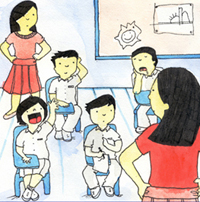Young Children’s Voices in Mathematical Problem Solving
Contributed by Dr Ho Siew Yin and Sng Wei Qin Abbie, from NTUC First Campus, for SingTeach Virtual […]
Read More
We all learn from experience. However, being able to do so can be more essential for some than others. And for teachers faced with the issues and challenges of 40 students, it has become vital to not only learn on the job but make adjustments fast enough to stay afloat.
The reality is that teachers today are finding it increasingly difficult to stop and think about what they’re doing and what they’ve learned from their students. This SingTeach article is a brief look at the dangers of “doing school” and what some educators are doing about it.
In countries such as the United States, 3 out of 5 teachers leave the profession within 5 years and cases of professional burnout is common – especially in public high schools with limited funding. While Singapore schools are better off, the problem of teachers leaving the profession is not uncommon. It seems that whatever the context, teaching is a tough job that just doesn’t get any easier.
 However, Karen Durica, a teacher for 35 years, believes that there is another source of danger that threatens the teaching profession. This is when teachers “do school” like they do their laundry. Just like they sort, wash and dry their laundry, teachers can get so bombarded with their work that they end up going through the motions of teaching, testing and grading their students without really thinking about how and why they do so.
However, Karen Durica, a teacher for 35 years, believes that there is another source of danger that threatens the teaching profession. This is when teachers “do school” like they do their laundry. Just like they sort, wash and dry their laundry, teachers can get so bombarded with their work that they end up going through the motions of teaching, testing and grading their students without really thinking about how and why they do so.
This is rationalised with the idea that “school is done that way” and changing things will just be too difficult, time-consuming and draining. As a result, everything is accepted without question and nothing new is learned from the job.
Given this situation, one would assume that the best thing to do would be to provide teachers with enough time to reflect and think on their own. True enough, a lot of programmes on teacher professional development have encouraged journal-writing, extended leaves, and even finding outlets for reflection such as poetry.
However, some educators believe that this may not be the only solution. Teachers today have become too isolated and are often left to deal with classrooms issues on their own. Whether it be due to limited time or simply an undermanned and overworked faculty, whatever one teacher gains from his or her experience is unlikely to be shared with others. Stacie Valdez, a veteran teacher, describes the importance of fighting against this isolation when she herself decided to mentor new teachers:
I wasn’t sure that I was ready to accept the mantel of sage, ready to offer wisdom, ready to suggest better ways. Regardless, my time has come. My goal is to see that no new teacher works in isolation only to become one of the forgotten. Our job is hard enough – it shouldn’t be done alone (Valdez, 2006).
While it is true that each teacher deals with a different group of students, leaving them to “do their own thing” can actually waste time and prevent them from learning something new about their work.
These issues have inspired a movement from individual teacher reflection to more organised programmes for groups of teachers to share problems, frustrations and yes, possible solutions.
For example, Singapore’s Teachers Network has been helping schools form Learning Circles where teachers work in groups to define and address problems through action research. Past SingTeach articles on action research projects have shown that teachers can be quite unaware of what their colleagues are going through. Herda, a primary school teacher, discovered this when she led a Learning Circle at her school 2 years ago:
We do have common worksheets but some classes need more help in a particular topic. One teacher may prepare extra worksheets to help her students without knowing that other classes are also facing the same problem. Two teachers then end up making extra worksheets for the same issue!
Alternatively, teachers from Victoria School took an online course in an effort to not only improve their teaching but also get colleagues to work together. Because they all embarked on the same course, implementing what they learned became a group project – instead of one teacher’s individual effort.
At the National Institute of Education, personal reflection is combined with group sharing in the Leadership in Education Programme (LEP). Here, journal-writing is a key component of a 6-month course where principals and school leaders are encouraged to both reflect and share on their experiences.
So teachers, it’s time to take a break from “doing laundry”. At times, the load may be heavy but your burden can be lessened when you share. A dose of sharing mixed with a dollop of reflection will go a long way into making us better teachers and educators.
References
Durica, K. M. (2007). How we “do” school: Poems to encourage teacher reflection. Newark, DE: International Reading Association.
Valdez, S. (2006). The veteran and the rookie. Retrieved October 9, 2008, from https://lessonplans.blogs.nytimes.com/2006/09/13/the-veteran-and-the-rookie